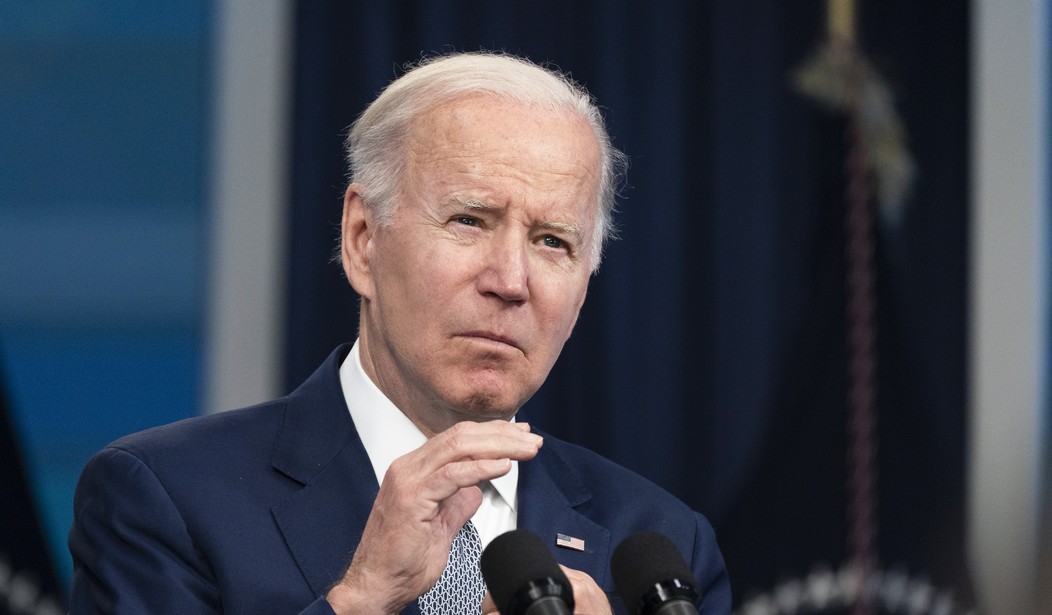We only wish we could. Faced with perhaps the worst midterm environment in living memory thanks to Joe Biden’s confidence-crisis cascade, Democrats are desperately looking for a way to salvage as many races as possible. CNN’s Ron Brownstein floats the idea that Democrats can “decouple” themselves from Biden’s stench by, er … weeellllll ….
To avoid the worst-case scenario in November, Democrats must defy one of the most powerful trends shaping modern congressional elections. Recent polls have provided them a glimmer of optimism that they might do just that.
That trend is the tightening correlation between voters’ attitudes toward a president and their support for US House, Senate and even gubernatorial candidates from his party. With President Joe Biden’s approval ratings falling to the lowest levels of his presidency, that traditional pattern threatens Democrats with sweeping losses in November’s midterm elections.
Which “recent polls” are these? It’s not the generic congressional ballot polling, which both FiveThirtyEight and RCP show as very stable and very bad for Democrats. On Monday, CNN’s own Harry Enten threw a deluge of cold water on the idea that polls have been trending well lately for Democrats, or even budging in their direction. Brownstein claims that Senate polls show Democratic incumbents “stabilized or improved their position,” but doesn’t link to any data to support that proposition. In Georgia, for instance, a Democrat-leaning pollster put Raphael Warnock behind GOP challenger Herschel Walker, which doesn’t sound like an improvement, or even a stabilization.
From these unsupported glimmers, Brownstein sees hope, or at least sees Democrats seeing hope. Brownstein sounds a bit skeptical himself, however — as he should be:
The question is whether this “decoupling,” as many political professionals call it, is a temporary blip in public opinion — or a reflection of enduring public doubts about the Donald Trump-era GOP that may override the typical reflex of voters unhappy with the president to vote for the other party.
“The fundamental question is: have forces been unleashed in the electorate that are more powerful than disappointment in Joe Biden?” says Simon Rosenberg, president of NDN, a Democratic research and advocacy group. “I would argue they have. Opposition to MAGA [the Trump movement] has been the driving force in the last two elections and it is likely to be the driving force in this one as well.”
Still, no one underestimates how sharp a break from recent history it will represent if Democrats en masse can escape the undertow of Biden’s sinking approval ratings. “It’s hard to fight history,” says Republican consultant Matt Gorman, who served as communications director for the National Republican Congressional Committee during the 2018 election, when a wave of discontent with Trump cost House Republicans dozens of seats. “It’s extremely hard.”
Again, Brownstein could have gotten an answer to this from Enten. The January 6 hearings have plenty of attention from voters, and it’s making no difference in their midterm vote. One may suspect it will make a difference if Trump wins the Republican nomination in 2024, but for now it’s a non-sequitur to the big issues facing voters every day — inflation, shortages, crime, and the loss of a stable economic outlook.
Josh Kraushaar, now at Axios, thinks Democrats face an even worse situation than the normal millstone effect of an unpopular president in midterm election. The data indicates a full-blown realignment in the electorate, with Democrats rapidly losing ground with working-class voters and becoming the party of the elitist clique:
We’re seeing a political realignment in real time.
Democrats are becoming the party of upscale voters concerned more about issues like gun control and abortion rights. Republicans are quietly building a multiracial coalition of working-class voters, with inflation as an accelerant. …
In the Times/Siena poll, Ds hold a 20-point advantage over Rs among white college-educated voters — but are statistically tied among Hispanics.
This looks much more realistic than the scenario that Brownstein paints. Joe Biden barely won in 2020 by running as an experienced centrist who had long worked across the aisle for pragmatic policy. Democrats actively pushed that message too, including those who have to face voters now that Biden and the party have dropped their masks and pursued a radical-Left agenda that has created massive economic and strategic problems. Far from being an experienced centrist hand, Biden has proven to be an incompetent crank, and his party more obsessed with rebranding Hispanics as “Latinx” rather than listen to their concerns about the economy, crime, and family cohesion.
Biden’s a large part of this potential realignment, but he’s not all of it. James Carville has warned since at least the elections in Virginia last year that the Democrats had stopped talking with and like the working class and instead started talking exclusively with and like the “faculty lounge.” The working and middle classes have noticed, and now are aligning with Republicans as a result.
Does that mean the GOP will win every contested seat in Congress in November? No — candidate selection matters, of course, and so do local politics. But expecting people to just ignore that massive bait-and-switch with Biden by Democrats in 2020 and the extremist incompetence that resulted from it is fantasy thinking in its most desperate. Democrats will pay a huge price for Biden in November because they deserve every ounce of penalty they will endure. And unless they stop obsessing with pronouns, ethnic labels, and biological nihilism, Democrats will pay that price for a long time to come.








Join the conversation as a VIP Member